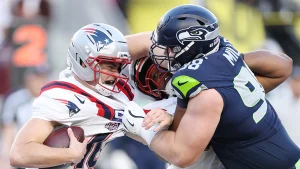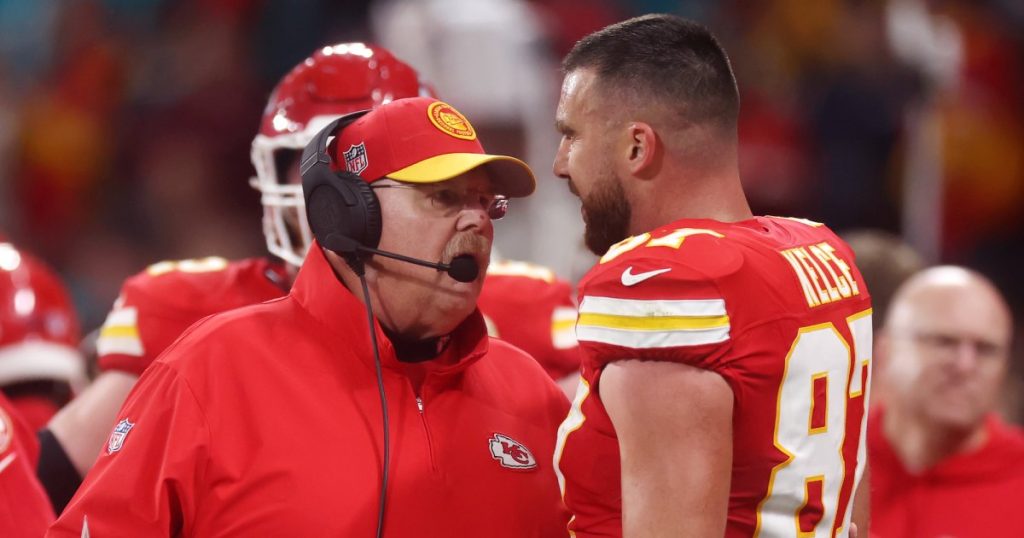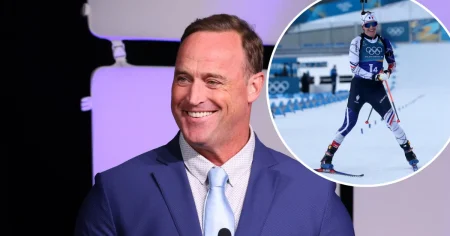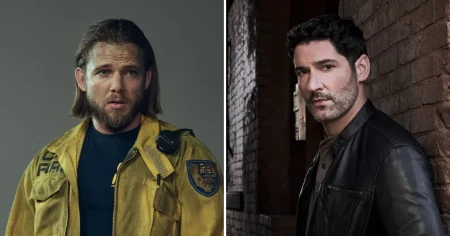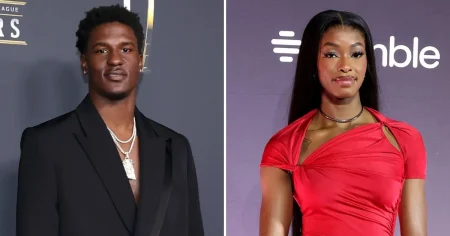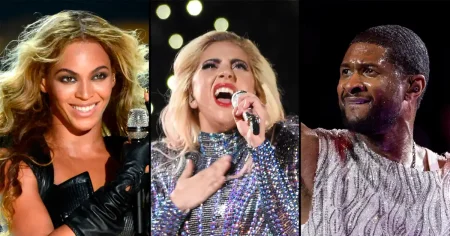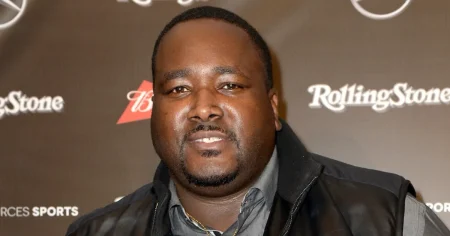Reid and Kelce: The Dynamic Duo Behind Chiefs’ Passion
In the world of professional football, where emotions run high and every play can alter the course of a game, the relationship between Kansas City Chiefs head coach Andy Reid and star tight end Travis Kelce offers a fascinating glimpse into the human dynamics that fuel championship teams. During the Chiefs’ recent game against the New York Giants, cameras captured an animated exchange between the 67-year-old coach and his 35-year-old tight end that quickly became social media fodder. The two were seen bumping chests on the sideline during the second quarter, sparking widespread speculation about tension between the two football icons. However, far from being concerned about the interaction, Reid embraced it wholeheartedly, telling reporters after the game, “I love Travis’ passion, man. I’m OK with that.” The veteran coach, understanding the emotional ebbs and flows of professional football, explained that the team actually “didn’t have enough of it in the second quarter,” suggesting that Kelce’s fire was precisely what the team needed at that moment. Reid’s mature perspective on the exchange reveals the nuanced relationship between a coach who has seen it all and a player who wears his heart on his sleeve.
Reid’s comments after the game painted a picture of mutual respect and understanding that transcends the occasional heated sideline moment. “The guy is all-in,” Reid said of Kelce, adding, “Sometimes, I have to be the policeman. He’s an emotional guy.” This characterization speaks volumes about the healthy dynamic between the two. Rather than viewing Kelce’s passion as insubordination or disrespect, Reid recognizes it as a valuable asset to the team’s competitive spirit. The coach’s urging that observers not “make too much of it” further emphasizes how normalized these emotional exchanges are within their relationship. “I love that he loves to play the game,” Reid elaborated, underscoring his appreciation for the tight end’s commitment. “It’s an emotional game, so I’ll take it.” This sentiment reveals the deep bond between coach and player that has been forged through years of collaboration, championships, and the shared pursuit of excellence. Their relationship exemplifies how emotional investment, even when it occasionally boils over, can strengthen rather than damage a professional partnership.
Quarterback Patrick Mahomes, who has front-row seats to the Reid-Kelce dynamic on a daily basis, reinforced the positive nature of their relationship. “He’s a guy that loves it,” Mahomes said, referring to Kelce’s emotional approach to the game. “That’s what’s made him so great. I know they love each other. That’s what you want out of the greats.” Mahomes’ perspective is particularly valuable, as he bridges the gap between coach and player, working intimately with both men to orchestrate the Chiefs’ offense. His comments suggest that rather than creating division, these passionate exchanges actually exemplify the authentic communication that drives elite teams. The quarterback’s matter-of-fact assessment implies that such moments are viewed within the organization not as conflicts but as manifestations of the competitive fire that has propelled the Chiefs to multiple Super Bowl victories. The game itself, which the Chiefs won 22-9 to secure their first victory of the season and improve to a 1-2 record, ultimately vindicated both Reid’s coaching and Kelce’s passionate approach, even if the tight end’s stat line was modest with four catches for 26 yards.
The sideline exchange between Reid and Kelce on Sunday bears striking similarities to another viral moment between the two during Super Bowl LVIII earlier in 2024. In that high-stakes situation, Kelce grabbed his head coach by the arm and shouted at him after being pulled from the game. Reid’s response to that incident further illuminates his leadership philosophy and the special relationship he maintains with his star tight end. “He caught me off balance,” Reid joked after the Super Bowl, defusing any notion of conflict with his characteristic humor. “Normally I’d give him a little bit [back], but I didn’t have [my] feet under me.” The coach explained that Kelce was essentially pleading, “Just put me in, I’ll score. I’ll score.” Reid’s comment that “I love that. It’s not the first time. I appreciate him” reveals a coach who values players who care deeply enough about contributing to occasionally cross the line of decorum. This recurring pattern suggests that both men understand each other’s motivations and have developed a shorthand for managing the inevitable tensions that arise in competitive environments.
The Reid-Kelce dynamic offers valuable insights that extend far beyond football. In an era when workplace relationships are increasingly scrutinized and formalized, their authentic, occasionally messy interactions demonstrate the value of allowing genuine emotions to surface rather than suppressing them beneath a veneer of professionalism. Reid, with his decades of coaching experience, demonstrates masterful emotional intelligence by distinguishing between counterproductive outbursts and the passionate commitment that drives excellence. By embracing rather than disciplining Kelce’s emotional expressiveness, Reid creates space for authenticity while maintaining his authority as head coach. This balance—knowing when to be “the policeman” and when to appreciate the fire—exemplifies leadership that adapts to individual personalities rather than forcing them into rigid behavioral templates. Their relationship shows that effective leadership isn’t about eliminating friction but channeling it productively.
As the Chiefs prepare to face the Baltimore Ravens in their upcoming home game, the viral moment between Reid and Kelce serves as a reminder of what makes championship teams tick. Beyond playbooks and physical talent, it’s the human connections—complete with their occasional complications—that form the foundation of sustained success. Kelce’s relatively quiet start to the season statistically (10 receptions for 134 yards and one touchdown through three games) hasn’t diminished his emotional investment in the team’s performance, nor has it affected Reid’s appreciation for his passion. Their relationship exemplifies how mutual respect creates the psychological safety necessary for authentic communication, even when that communication becomes heated. In professional sports, where the margins between victory and defeat are razor-thin, these genuine human connections often make the difference. The Reid-Kelce partnership, with all its passion and occasional sideline drama, continues to demonstrate that championship teams are built not just on talent but on relationships strong enough to withstand the intense pressures of competition at the highest level. Their dynamic proves that when respect runs deep enough, even the most animated disagreements ultimately strengthen rather than weaken the bonds between leaders and those they lead.

